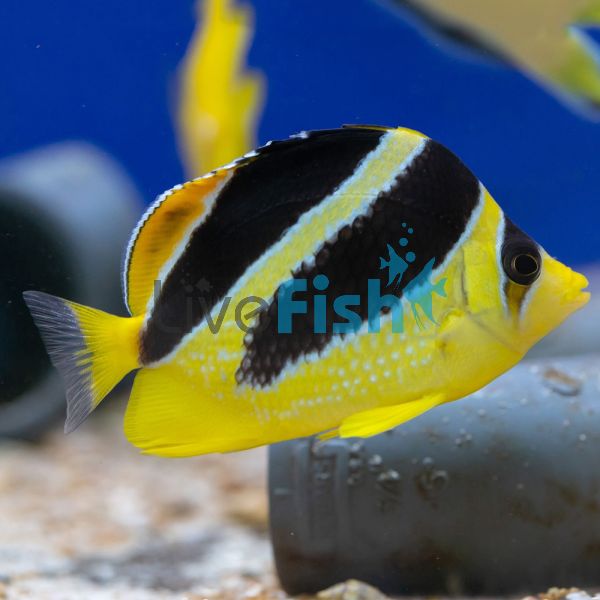Mitratus Butterflyfish - Medium
This butterflyfish species spends its time in the wild at depth. It was so rarely seen that Gunther's description was the most people knew about it for the next 113 years after he initally described it. Making this an uncommon and special fish in anyone's aquarium.
The body structure and colour of the Mitratus Butterflyfish are unusual. The colour of this Butterflyfish is yellow with two thick dark brown to black diagonal bands. One running from in front of the dorsal fin and the other nid way down the dorsal to the end of the dorsal fin and across its back. It also has a dark brown to band that run down through it's eye. The back part of their dorsal fin can also be orange to brown.
It features a projecting snout capped with a small mouth, and its body is triangle-shaped and laterally compressed. The dorsal fin is continuous, while the tail fin is rounded. In the wild, this species can grow to be about 5.51 inches (14 cm) long, but, most specimens available are around 2 3.4 to 3 inches long (7 - 8 cm). Most Chaetodon species have a lifespan of 5 to 7 years, yet, with adequate care, these fish have been known to live up to 12 years.
Gunther described the Mitratus Butterflyfish Chaetodon mitratus in 1860, and it was initially discovered on Mauritius Island. They can be found in the Indian Ocean, East Africa, South Africa, and the oceanic islands of Madagascar, the Maldives, Chagos, Mauritius, Sri Lanka, the Andaman Sea, and India, as well as the Christmas and Cocos-Keeling Islands. They are normally found between 98 and 230 feet (30 and 70 meters) below the surface but have been discovered as deep as 590 feet (180 m).
Tank Recommendations for Mitratus Butterflyfish
This is a hardy butterflyfish that gets along with a wide range of tank mates. It does need a large, well-established aquarium. A 55-gallon or 208 litre tank is recommend as the smallest size for a single fish, and if you wish to keep more than one, you'll need a larger tank. Decorate the tank with rocks and/or corals, as well as enough swimming areas and hiding spots for adults. It swims freely and spends a significant amount of time in open water as well as going in and out of crevices.
The Mitratus Butterflyfish is recommended for intermediate aquarium keepers. It requires no particular specific maintenance and will grow to be a pretty hardy pet. Even when first introduced to the aquarium, it will accept food promptly and will eat a variety of meals. When it is properly acclimated, it will even go up to the surface to accept food from its keepers. This fish does not have a reputation for eating coral, but it has been known to consume the polyps of some stony coral species.
Suitable Tank Buddies
The Mitratus Butterflyfish is considered a reef-safe fish since it thrives in a coral-rich environment. However, it may destroy some hard coral species and attack shrimp and other moving invertebrates. It will thrive in a fish-only community tank with plenty of rocks and corals, as well as plenty of hiding spots.
Usually Compatible
Because this species is not hostile, choose tank mates who are neither territorial nor aggressive. So almost any other Butterflyfish, as well as smaller non-aggressive fish such as Cardinalfish, Gobies and Batfish make good tankmates. Most other species of Butterflyfish, Fairy Basslets, Fairy and Flasher Wrasses, Clownfish Parrotfish are all usually compatible.
Sometime Compatible
Mitratus Butterflyfish can sometimes be compatible with larger, more territorial fish like Triggerfish, Filefish, and Scorpionfish.
Rarely Compatible
Groupers, Sharks, and Snappers are rarely compatible with Mitratus Butterflyfish, depending on the size of the aquarium tank as they are likely to view it as prey.
Feeding your Mitratus Butterflyfish
The Mitratus Butterflyfish is an omnivore that feeds on benthic invertebrates and planktonic objects in the wild. In the aquarium, no special food is required; they will eat a wide variety of foods. Meaty dishes, dried flakes, shrimps, and small pellets are all suitable. Nori, a Japanese specialty, will also be popular. Feed it at least twice a day, and if it's a small juvenile, 3 to 4 times a day.
| Scientific Name | Chaetodon mitratus |
|---|---|
| Care Level | Moderate |
| Common Names | Headband Butterflyfish, Oblique-banded Butterflyfish, Mitratus Butterflyfish, Mitra Butterflyfish, Indian Butterflyfish |
| Diet | Omnivore |
| Fish Family | Chaetodontidae |
| Lifespan (years) | 10 |
| Max. Length (cm) | 14 |
| Min. Tank Volume (l) | 208 |
| Origin | Mauritius Island, Indian Ocean, East Africa, South Africa, Madagascar, Maldive, Chagos, Mauritius, Sri Lanka, The Andaman Sea, India, the Christmas & Cocos-Keeling Islands |
| Reef Safe | Yes |
| Sociability | Peaceful |
| Venomous | No |




